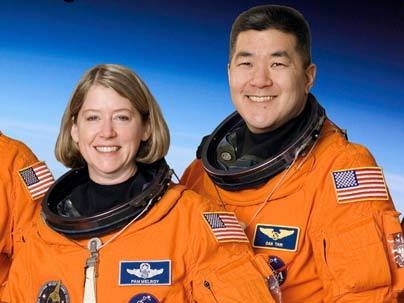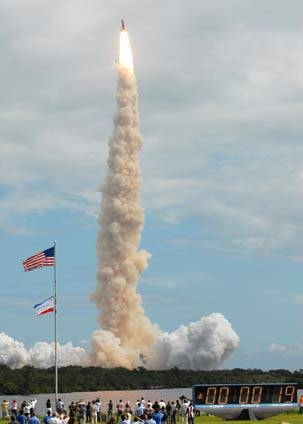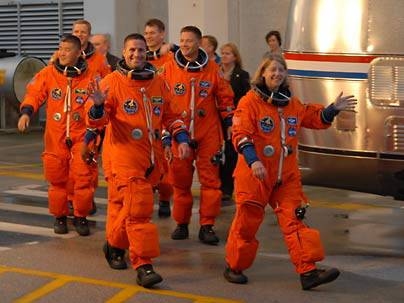Astronaut Pamela Melroy (S.M. 1984) became the first MIT alumna to command a space mission when the space shuttle Discovery lifted off Tuesday, Oct. 23, from the Kennedy Space Center in Florida.
Discovery, which rocketed away despite the threat of poor weather, will deliver fellow MIT alum Daniel Tani (S.B. 1984, S.M. 1988) to the International Space Station where he will serve as flight engineer. Tani will perform three spacewalks and numerous robotic arm operations supporting space station assembly before his scheduled return to Earth in mid-December.
Tani will join ISS Expedition 16 commander Peggy Whitson and flight engineer Yuri Malenchenko, who were launched aboard a Soyuz spacecraft from the Baikonur Cosmodrome on Oct. 10. When Discovery reached orbit, it marked the first time women have simultaneously commanded two spacecraft.
Discovery's primary mission is to attach the Node 2 connecting module, Harmony, to the space station. Harmony will be utilized to attach two new scientific research laboratories--Columbus, built by the European Space Agency, and Kibo, built by the Japanese Space Agency--during the next two space shuttle missions.
"I'm just really excited to actually get going," Melroy said Friday during her crew's arrival at the Kennedy Space Center.
While pursuing her B.S. degree in physics and astronomy at Wellesley College, Melroy participated in the Air Force ROTC program at MIT, where she became ROTC cadet commander during her senior year.
"My ROTC experience at MIT was the groundwork for my leadership training," she said.
Her master's thesis under the direction of Professor James Elliot involved studying the atmosphere of Neptune by observing the occultation of stars by the planet.
She was commissioned as an Air Force officer after graduation from MIT in 1984 and received her pilot wings in 1985. Melroy flew the KC-10 tanker in the Persian Gulf War and was a test pilot for the C-17 cargo aircraft. She has flown more than 5,000 hours in 45 different aircraft. Melroy retired earlier this year from the U.S. Air Force with the rank of colonel.
Melroy was selected as a NASA astronaut in 1994 and became the third woman to pilot a space shuttle in 2000. In 2002, she piloted her second space shuttle mission and has logged more than 562 hours in space. Melroy is the second woman astronaut chosen to command a U.S. space mission. Eileen Collins previously commanded missions in 1999 and in 2005.
"I think the future of human space exploration is never ending," Melroy said in a preflight interview. "I think there's something that is profoundly moving about the idea of exploring. I find the exploration of space to be so inspirational and fascinating."
In addition to Melroy, four other MIT-educated astronauts have commanded U.S. spaceflights.
Astronaut David Scott (S.M. and E.A.A. 1962) was the first MIT graduate to command a space mission. He led the Apollo 15 lunar landing mission and spent more than 18 hours exploring the lunar surface in 1971.
In 1984, Frederick Hauck (S.M. 1966) became the first MIT graduate to command a space shuttle mission. He also led a mission in 1988, which successfully returned the shuttle to flight after the Challenger disaster.
Kenneth Cameron (S.B. 1978, M.S. 1979) commanded two space shuttle missions in 1993 and 1995.
William Shepherd (S.M. 1978) commanded the crew that began the permanent human presence onboard the International Space Station in November 2000.
A version of this article appeared in MIT Tech Talk on October 24, 2007 (download PDF).








